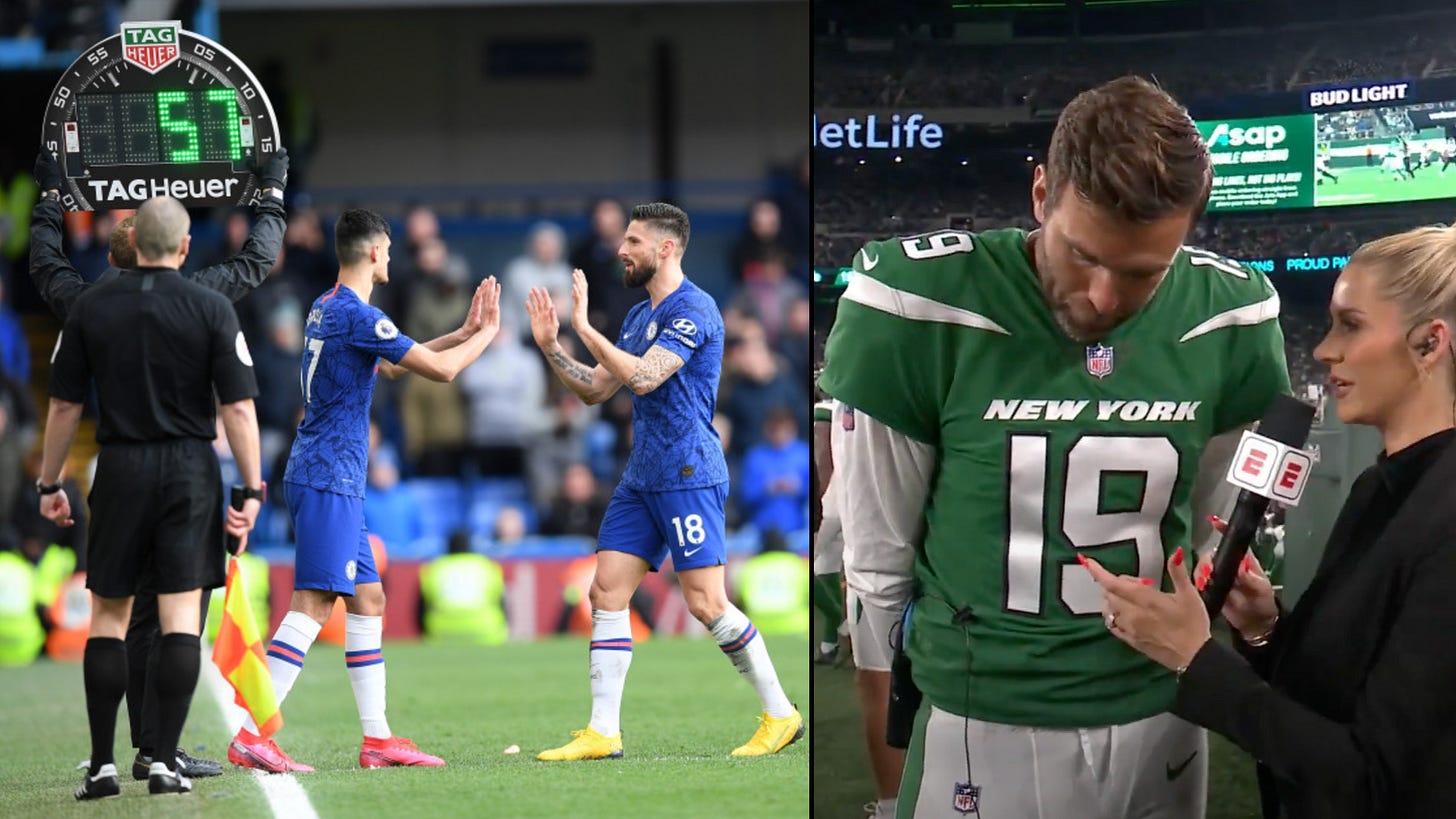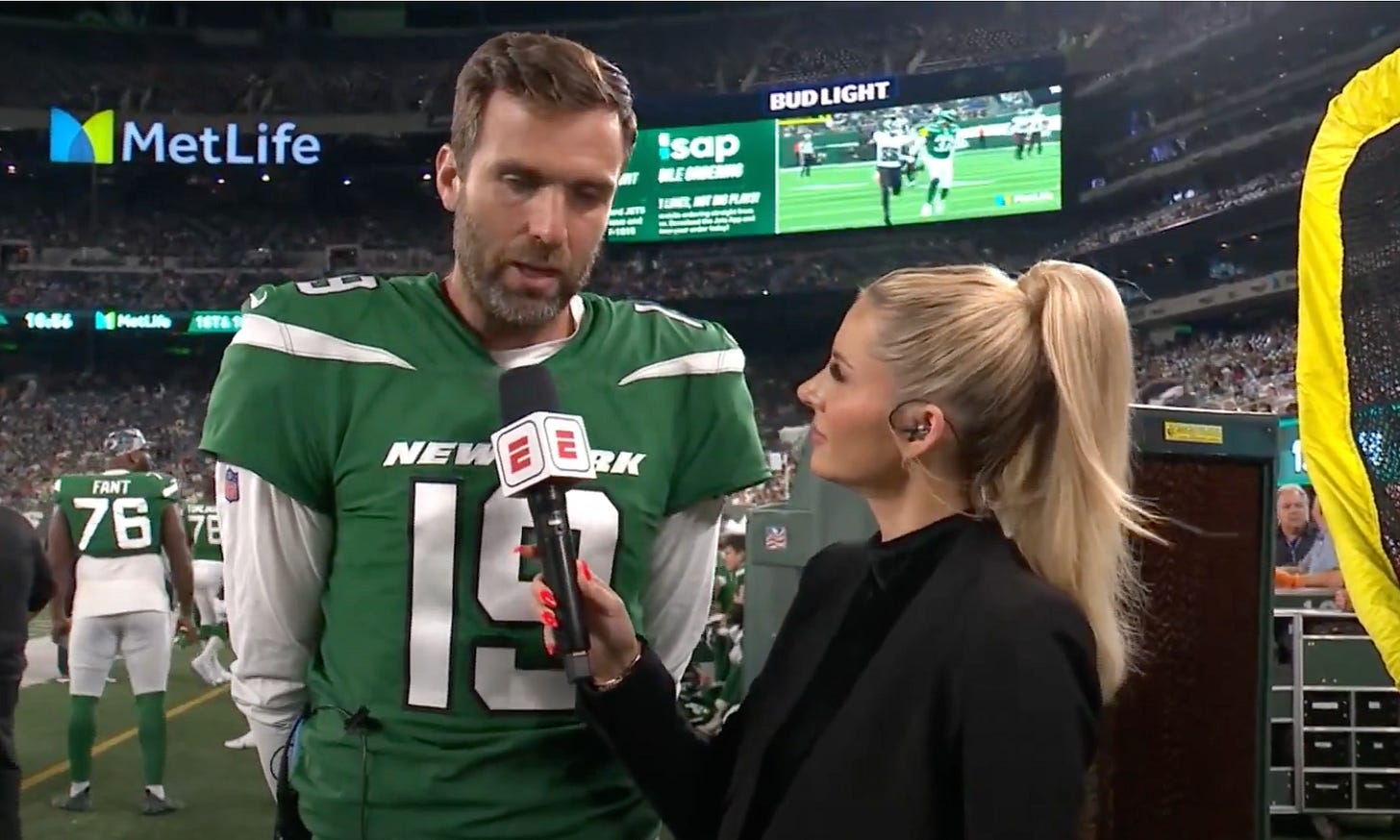The Premier League Embraces American Nonsense
We don't need more interviews with players and coaches during matches.
You’re having a bad game. Maybe you’re a young starlet who’s been anonymous for 76 minutes out on the wing. Maybe you’re a midfield #6 who coughed up the ball and handed the opposition a chance that they took. Regardless, you’re getting substituted.
You see your number in red on the fourth official’s board and trudge over to the sidelines and grimace as you do the double-high-five with the teammate that your manager thinks will do a significantly better job out there than you have. You make your way to the bench, trying to contain any outward demonstration of your feelings about what just happened because you know a camera is on you somewhere. You’re seeking the shadowy oasis of the dugout.
And then a reporter shoves a microphone in your face.
OK, the BBC reports that there will be a “cool-down period,” but a scenario like this is coming soon. Because as part of the Premier League’s new domestic TV deal — four years, £6.6 billion — the broadcasters will have the right to interview newly substituted players.
As a fan of the club that just signed Kepa Arrizabalaga, the most chaotically substituted goalkeeper of recent times, this is concerning. As a player, it must be infuriating, and that’s before you get to the detail that “camera operators will also be allowed to briefly enter the field of play to film close-ups of goal celebrations.” Don’t we already have close-ups? Don’t the players celebrate for the cameras as it is? How long until a cameraman slips on a slick pitch and slide-tackles a center forward? Who asked for this?
The (non-)answer is quintessentially American: “People don't know what they want,” Steve Jobs once said, “until you show it to them.”
The camerawork and production value in U.S. sports broadcasting can be spectacular. But tune into any American sporting event, and you’ll be treated to a sideline interview with a coach or player who is not happy to be there. He will often endeavor to say absolutely nothing at all, and why would he do any differently? Why would he give away anything that might give his opponent a competitive advantage just to titillate us on our couches? He’s probably not going to offer up some incisive philosophical point about the nature of the game, either. Almost always, you’re going to get a canned line about executing on offense.
Some of the best coaches of all time have made a sport out of not answering these questions on the sideline. Before he became a college coach with a youthful companion, Bill Belichick rarely offered sideline reporters more than a grunt on his way to six Super Bowl titles with the New England Patriots. San Antonio Spurs coach Gregg Popovich scarcely told a reporter anything at halftime, and sometimes explicitly critiqued the whole enterprise while the interview was going on. Then, as if to drive home his real issue with it, he’d sit down for a press conference once the game was done and often dole out incredible news copy for the beat writers in attendance.
The situation with American players is rarely better. I love the Arsecast — greatest football show of our time — but I was amazed to hear James McNicholas say last week that he thinks of American athletes as more expressive than their Premier League counterparts. I’ve read and conducted a few interviews in my day, and very few American athletes are truly open about what they’re feeling or what they think, particularly before retirement.
Again, why would they be? What’s in it for them, beyond a small chance of a Humanizing Moment weighed against the sizable risk that the whole thing will somehow backfire? Personally, if I could make millions playing basketball, I probably wouldn’t spend much time talking to the press.
There are exceptions to every rule, of course, and some athletes love chatting to the media. But sometimes, the press-weariness continues even into post-retirement life. It was incredible to interview Wayne Gretzky, but he was the most skilled deflector of questions I’ve encountered. He’s been sparring with reporters for longer than I’ve been alive. Or maybe I was just a rookie and couldn’t get the quote!
Because all this isn’t to discredit the necessary craft of interviewing athletes. Sometimes it’s good! But almost never during a game they’re trying to win. These people got to where they are through a kind of relentless competitiveness that the rest of us really don’t fully understand. They’re not looking to dish the tea at halftime.
If athletes at English clubs are anything like American ones, it probably won’t spell success for this new Premier League broadcasting initiative. It’s going to be awkward at times and mostly boring. If it trends towards the latter, rest assured that the broadcasters will start actively seeking the kind of Viral Moments necessary to justify the whole endeavor. This should make athletes and coaches even more guarded, even when they’re walking into the dressing room.
Because they’re putting cameras there, too! Now you can’t even chew out a teammate for going to sleep at the back post without it becoming fodder for the digital discourse.
The BBC does assure us that “full details of the changes to coverage have yet to be confirmed by the Premier League,” and I hope they will seriously consider those full details. The Americanization of this product — to the point that we’re calling it a product — may be harrowing to the English, but it’s a problem for we Americans, too. When I spoke with Rebecca Lowe for a story on NBC’s coverage of the Prem, she had a neat explanation for how they styled their broadcast for a U.S. audience: “If you’re watching an English product,” she said, “you probably do want a little bit of Englishness associated with it.”
———————————
Thanks for being with us here at The Football Weekend. If you’re signed up, you’ll get every new post free in your inbox:
And if you like sharp conversations, thoughtful commentary, and on-the-ground reporting, you can make more of it happen for the price of a pint:





